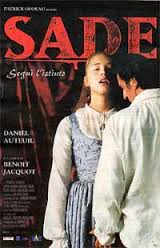
SADE
France, 1999, 100 minutes, Colour.
Daniel Auteuil, Marianne Denicort, Gregoire Colin, Isild Le Vesco, Jean Pierre Cassel.
Directed by Benoit Jacquot.
Sade is one of two films made in 1999 about the famous Marquis de Sade. He had been played by Keir Dullea in a film called De Sade in the late '60s. He had also been the subject of the famous Marat- Sade which was filmed by Peter Brook in the mid-'60s. The other 1999 film of the Marquis de Sade was written and directed by Philip Kaufmann and starred Geoffrey Rush as the Marquis. It was called Quill and co-starred Michael Caine, Kate Winslett and Joachim Phoenix.
This film focuses on the person of the Marquis and gives us some background to the critiques of his writings and his libertine attitudes. However, on the whole, it is a rather stately historic reconstruction of 1794. It is the era of Robespierre and his war against immorality and atheism. The Marquis finds himself released from prison and sent to Picpus, a home for nobles and those who were to go to the guillotine. However, Robespierre is overthrown and the Marquis and the others are freed. The film focuses on his attachment to a young girl and his sexual initiation of her with the gardener of the institute. It is only in this sequence towards the end that there is an major visual suggestion of the sadism and eroticism of the Marquis. Instead, the film offers a philosophical look at the erotic, body and soul, freedom and being libertine in the context of the French Revolution and its beliefs.
1. Interest in the Marquis de Sade? Sexuality, eroticism, sadism? Freedom? The historical perspective and his being seen as symbolising 18th century France? A victim of the Revolution?
2. The re-creation of France and Paris 1794? Costumes and decor? The prison, the roads and the villages, the institution at Picpus? The guillotine and the atmosphere of the Revolution? The musical score?
3. The focus on the character of the Marquis? Daniel Auteuil's interpretation? Sympathetic, unsympathetic? Libertine? Writer, philosopher? Theory and practice? His being a victim of the Revolution? A romanticised version? The focus on the prison, de Sade amongst the prisoners, the squalor? The
executions? The atmosphere of the terror? His being transferred? Travelling to Picpus, the encounter with the de Lancris family? Understanding them? The attraction towards Emilie? The arrival, Coignard and his attitudes, running the institution, his wife? The rooms, the meals, the grounds? The nobles occupying their time? Pining for the monarchy? The range of characters, their dress, make-up, playing cards and occupying their time? The attitudes towards de Sade?
The de Lancris family, the mother and her suspicion of the Marquis, her husband and his roving eye, his liaison? Her health, walking in the garden, devotion to her daughter? Suspicion of her husband? His affair with the woman in the institute? (And her husband's response?) The actress and her style? De Sade and his observations of all these goings-on?
4. Emilie, her age, sheltered, nobility? Her reaction to her parents, curiosity about de Sade? Going to his room, listening to him? Fascinated by his philosophy, her prurient curiosity? Virgin, sexuality? The gradual transformation? Observing the play, deciding to be in it? The build-up to the initiation sequence, the encounter with Augustin and her throwing the rose away? The encounter with him? The transformation, discovery of sensuality, loss of virginity? Her disregarding Augustin the next day? The final speeches with de Sade, their never meeting again?
5 Sensible and her relationship to de Sade, her love for him, enabling him to reflect? The sexual liaison? Their son? Their visiting the prison and the institution? The nature of their relationship? Emilie and her looking after Charles? Sensible and her relationship with Fournier? His intensity, being a disciple of Robespierre? His attitude towards de Sade? Brutality and lust towards Sensible? His enabling de Sade to be released from prison? His meeting with Robespierre, their association, Robespierre's downfall and both their executions?
6. De Chevalier and the young man attached to him? The intimations of homosexuality? De Sade's attitude towards this relationship? The young man and his curiosity, watching the initiation, involvement? The aftermath with the priest and the prayers at the burial site?
7. The guillotine, the victims, Robespierre's fall? The change and the hope for the future in building on the nobility who hadn't died? De Sade and his release? The reintroduction of the church and the blessing of the grave site?
8. How clearly did the film give the ideas and attitudes of de Sade? Sexuality, sadism (and he scene with his being whipped)? Freedom of behaviour, thought? The abstract theory of freedom in the context of French philosophy and the French Revolution?